Autism in Indonesia
Can Idris, a non-verbal autistic boy who has been isolated from others in his devout rural Indonesian village, find a place in his family and community?
Can Idris, a non-verbal autistic boy who has been isolated from others in his devout rural Indonesian village, find a place in his family and community?
Well over half a million children in Indonesia are on the autism spectrum and have varying difficulty with social interaction and communication. Idris is a nonverbal autistic boy living in rural Java who struggles to communicate and connect with others in his village. This is his story, and a story of how grassroots disability awareness movements, local cultural models of inclusion, and religious principles can unite to better support all members of a community.
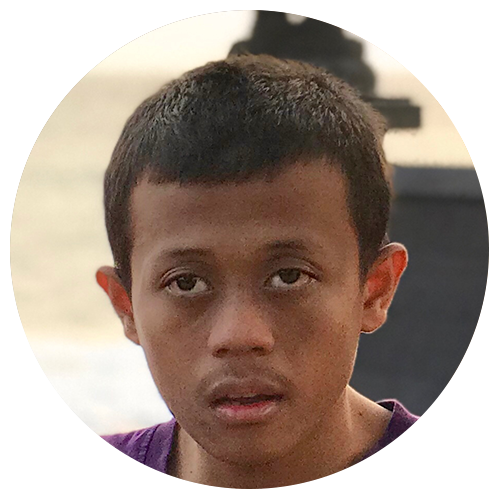
IDRIS
Autistic
Idris was born in Jakarta, Indonesia and now lives in a small village in Central Java. He enjoys listening to prayers and songs on his cell phone, and making toys out of sticks and string. When he was two, he fell off a porch, suffering injuries. Soon after, he lost the ability to speak and developed behavioral challenges. He was then diagnosed with autism. Idris and his family have at times faced stigma from their fellow villagers over his developmental differences. He has sporadically attended a public school for children with disabilities and undergone a variety of treatments with doctors and traditional healers. Now seventeen, he has a severe speech delay and other impairments, but is quick to learn new skills in a supportive educational environment.
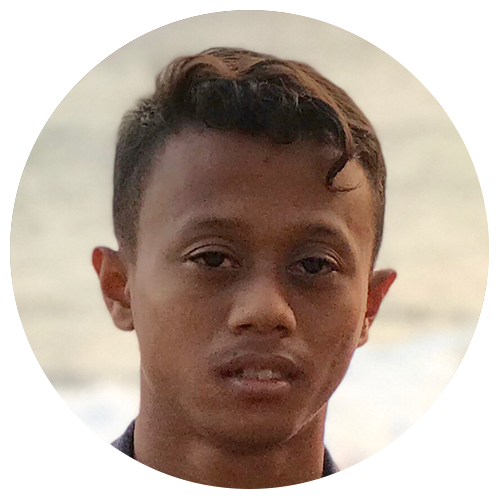
IDRUS
Twin brother
Idrus is Idris’ neurotypical twin brother. He was a young child when his parents separated, and was raised by his paternal grandmother on the island of Lombok with sporadic contact with his mother and brother. He currently attends an Islamic high school and practices karate in his spare time. He plans to go to an Islamic college and study to become a preacher.
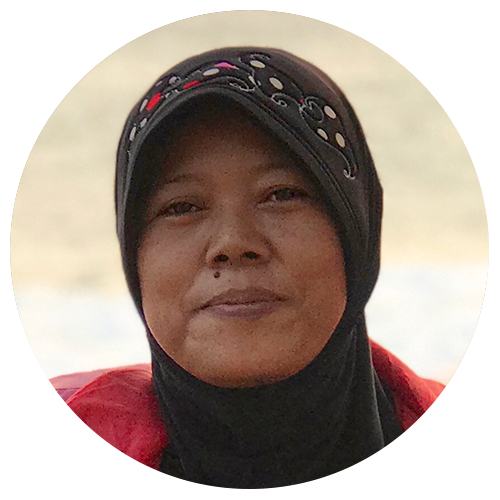
ISTI
Mother
Isti, the mother of Idris and Idrus, is from a rural village in Central Java. She met and married the twins’ father, Mala, while working at a factory in Jakarta. The couple struggled to work and care for both children, so Mala’s mother agreed to take care of Idrus in her hometown on the neighboring island of Lombok. After Idris was diagnosed with autism, the rest of the family moved to Lombok as well. They enjoyed being together as a family, but the strains on the marriage led the couple to divorce. Isti took Idris back to her hometown in Java, where she remarried an older distant relative, Sular. She has struggled to raise Idris, at times facing judgment from her community and unsure how to best respond to his medical, behavioral, and learning difficulties.

MALA
Father
Mala was born on Lombok, an island in Western Indonesia. His father was a schoolteacher. He went to work at a yarn spinning factory in Jakarta, where he met Isti. After they had the twins, the couple put all their money towards treatments for Idris, and their finances were soon drained. Mala returned to his hometown of Lombok, but was unable to find steady employment. He lives with his mother and works as a part-time caretaker for a vacation house on the nearby island of Gili Trawangan.
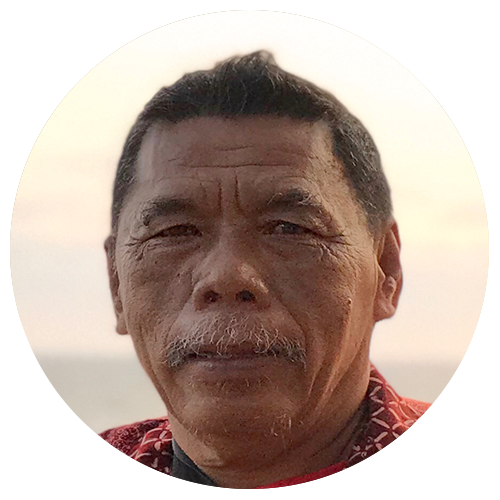
SULAR
Idris’ stepfather
Sular is a widower who also lost his daughter to a liver disease. At his family’s urging, Sular remarried Isti, despite the large age gap between them. He genuinely loves and cares for Idris and Isti, but his mother, who used to live with them, was less open to the mother and son.
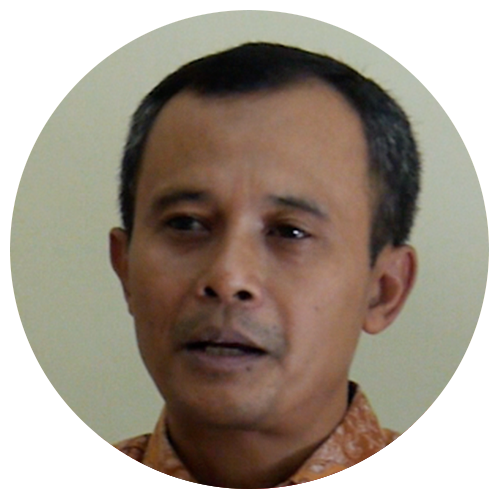
YASIN
Idris’ teacher, founder of Bina Angitta Autism School
Muhammad Yasin is the founder of Bina Anggita, a private school in Yogyakarta serving children with autism. With a college degree in Special Education, he has also established the Yogyakarta Center for Autism Services, where he is in charge of training and hiring teachers and therapists, as well as training parents with autistic children. He has two daughters with his wife, who also teaches individuals with disabilities.
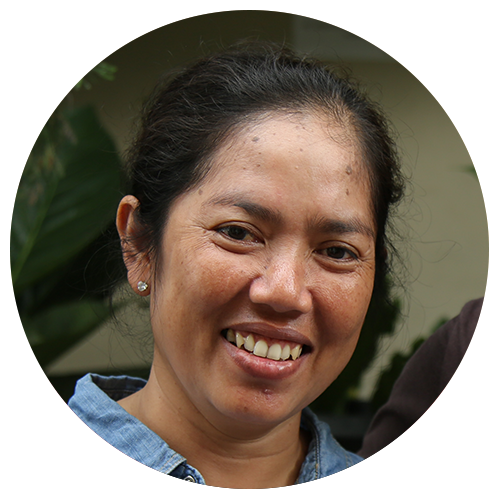
HERMI
Awareness Advocate
Hermi lives in Yogyakarta with her husband and three sons. After her oldest son, Osa, was diagnosed with autism, she founded an association of parents with autistic children, called Forum Kompak. Through Kompak, she works to spread autism awareness and to support the wellbeing of autistic children and their families.

OSA
Hermi’s autistic son
Osa was diagnosed with autism when he was 15 months old. Since early childhood he has shown exceptional observation and memorization skills, and repeatedly surprised his father by accurately identifying the model and year of passing cars. He also showed a precocious interest in mechanics; after teaching himself to dismantle and repair fans, speakers, and other small equipment, he now fixes neighbors’ belongings for a small fee. He is also a self-taught musician who can play the piano, the guitar, and gamelan instruments and often performs for local events.
2021. New York International Film Awards. Best Ethnographic Film.
2021. 4th Dimension Independent Film Festival. Best Documentary Film, Finalist
2022. Dumbo Film Festival. Documentary Feature, Semi-Finalist.
2019. Society for Visual Anthropology Film and Media Festival, Feature Length
2022. Peloponnisos International Documentary Festival
2022. Golden Door International Film Festival
2022. Glendale International Film Festival
CO-DIRECTOR
Robert Lemelson is a cultural anthropologist and ethnographic filmmaker. Lemelson currently is a research anthropologist in the Semel Institute of Neuroscience UCLA, an adjunct professor of Anthropology at UCLA, and a visiting professor at USC. Lemelson founded Elemental Productions in 2007, a documentary film company and has directed and produced over a dozen ethnographic films related to culture, psychology and personal experience.
CO-DIRECTOR
Chisako Yokoyama has worked as an editor and assistant editor on studio motion pictures, independent features and narrative and documentary films. Her credits as editor include the English and Japanese language films “Saki,” “Takamine” and “Goemon” and as first assistant editor, “American Gangster”, “Memoirs of a Geisha”, “Black Hawk Down”, “Gladiator”, and “Good Will Hunting.”
CO-PRODUCER
Ninik Supartini has assisted Dr. Lemelson in several research projects about community mental health in Java and Bali. In 2004, she returned to school at Gadjah Mada University to earn her Masters Degree in Developmental Psychology.nSince 2006, Supartini has served as a mental health and psychosocial consultant for international humanitarian organizations working in post-disaster and conflict areas in Indonesia and Myanmar.
CO-PRODUCER
Annie Tucker is a translator, writer, and educator specializing in contemporary Indonesian culture, literature, arts, and health. She received her PhD from UCLA’s Department of World Arts and Cultures. Her dissertation addressed the treatment of autism in Java with a particular focus on the therapeutic use of traditional arts and the philosophies of development embedded within them. She is an adjunct lecturer for UCLA’s Disability Studies minor.
ASSISTANT CAMERA
Bella Stasia has filmed commercial music, wedding and lifestyle videos in addition to documentary and feature work.
DIRECTOR OF PHOTOGRAPHY
Darwin Nugraha has directed, filmed and edited feature and short documentaries in Indonesia. He has produced a TV series and is currently working on a feature length documentary.
-Temple Grandin